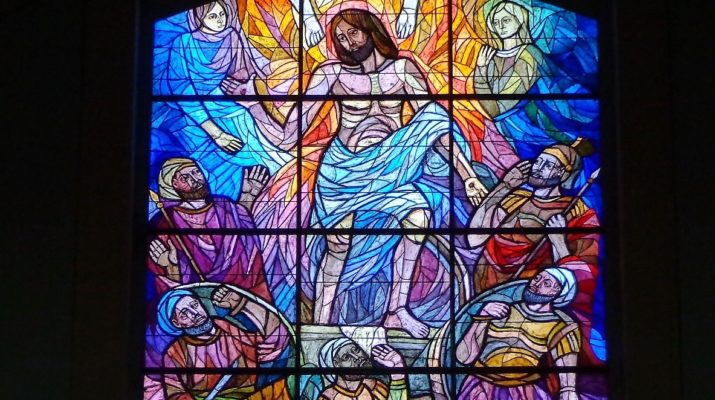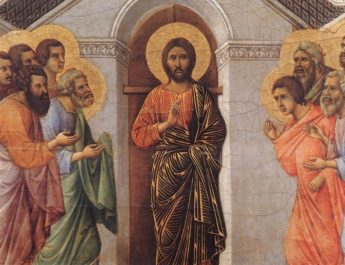Matthew 28:1-10
Easter, A20
1 After the sabbath,A as the first day of the week was dawning,B MaryC MagdaleneD and the other Mary went to seeE the tomb.
A “sabbath” = sabbaton. From Hebrew shabbath (sabbath); from shabath (to rest, stop, repose, cease working; by implication, to celebrate). This is the sabbath. It can also be used as shorthand for a week i.e. the time between two sabbaths.
B “dawning” = epiphosko. 2x in NT. From epi (on, upon, among, what is fitting) + phos (light, a source of light, fire, or radiance; light with specific reference to what it reveals; luminousness whether natural or artificial, abstract or concrete, literal or figurative); {from phao (to shine or make visible, especially with rays of light)} OR from epiphaino (to shine on, give light to); {from epi (on, upon, among, what is fitting) + phaino (to bring light, cause to appear, shine, become visible or clear)}. This is to grow light or let shine. It can mean to dawn or be about to start.
C “Mary” = mariam.From Hebrew Miryam (Aaron and Moses’s sister); from marah (to be contentious, rebellious, bitter, provoking, disobedient; to be or make bitter or unpleasant; figuratively, to rebel or resist; causatively to provoke). This is Miriam or Mary.
D “Magdalene” = Magdalene. 12x in NT. From Magdala (Magadan, a place near the Sea of Galilee); perhaps from Aramaic migdal, see also Hebrew migdal (tower); from gadal (to grow, grow up, be great). This is from Magdala.
E “see” = theoreo. From theaomai (to behold, look upon, see, contemplate, visit); from thaomai (to gaze at a spectacle; to look at or contemplate as a spectator; to interpret something in efforts to grasp its significance); from theoros (a spectator or envoy). This is gazing, beholding, experiencing, discerning. It is looking at something to analyze it and concentrate on what it means. This is the root of the word “theatre” in that people concentrate on the action of the play to understand its meaning.
2 And suddenlyF there wasG a great earthquake;H for an angelI of the Lord,J
F “suddenly” = idou. From eido (to be aware, see, know, remember, appreciate). This is see! Lo! Behold! Look! Used to express surprise and or draw attention to the statement.
G “was” = ginomai. This is to come into being, to happen, become, be born; to emerge from one state or condition to another. This is coming into being with the sense of movement or growth.
H “earthquake” = seismos. 14x in NT. From seio (to shake, move, or quake to and fro; figuratively, to create agitation, fear, or worry). This is a commotion or shaking generally. It can also be a storm or earthquake. This is where “seismic” comes from.
I “angel” = aggelos. Probably from ago (to lead, bring, carry, guide) + agele (flock, herd, drove) [also from ago (see above)]. This is angel or messenger. Properly, it is one sent with news or to perform a specific task. This messenger can be human or an angel from heaven. More commonly, it is used for angels in the New Testament.
J “Lord” = kurios.From kuros (authority, supremacy). This is a respectful address meaning master or sir. It refers to one who has control or power greater than one’s own. So, it was also applied to God and Jesus as Master or Lord.
descending from heaven,K came and rolled back the stone and sat on it. 3 His appearanceL was like lightning,M and his clothingN whiteO as snow.
K “heaven” = ouranos. May be related to oros (mountain, hill) with the notion of height. This is the air, the sky, the atmosphere, and heaven. It is the sky that is visible and the spiritual heaven where God dwells. Heaven implies happiness, power, and eternity.
L “appearance” = idea. 1x in NT. From eidea (else, otherwise, if not); {from ei (if, whether) + de (then, but, now, indeed) + me (not, never)} OR from eido (to be aware, see, know, remember, appreciate). This is sight, appearance, or figuratively an idea. This is where “idea” comes from.
M “lightning” = astrape. 9x in NT. From astrapto (to flash with or like lightning, be dazzling); probably from aster (star literally or figuratively); probably from stronnumi or stronnuo (to spread, make a bed). This is lightning, brightness, glare, or ray.
N “clothing” = enduma. 8x in NT. From enduo (to clothe, put on in a literal or figurative sense); {from en (in, on, at, by, with, within) + duno (to enter, sink into; can also be set like the sun); {from duo (to sink)}}. This is clothing, especially outer robes. This is clothing as something one sinks into.
O “white” = leukos. Related to luke (light). This is bright, white, or brilliant.
4 For fearP of him the guardsQ shookR and became like dead men. 5 But the angel said to the women,S “Do not be afraid;T
P “fear” = phobos. From phebomai (to flee, withdraw, be put to flight). This is panic flight, fear, fear being caused, terror, alarm, that which causes fear, reverence, respect.
Q “guards” = tereo. From teros (a guard or a watch that guards keep); perhaps related to theoreo (gazing, beholding, experiencing, discerning; looking at something to analyze it and concentrate on what it means; the root of the word “theatre” in that people concentrate on the action of the play to understand its meaning); from theaomai (to behold, look upon, see, contemplate, visit); from thaomai (to gaze at a spectacle; to look at or contemplate as a spectator; to interpret something in efforts to grasp its significance); from theoros (a spectator or envoy). This is to guard, observe, keep, maintain, or preserve. It can also be used figuratively for spiritual watchfulness. It is guarding something from being lost or harmed – keeping an eye on it. Contrast the Greek phulasso, which is to guard something so that it doesn’t escape. Also contrast koustodia, which generally denotes a fortress or military presence. This word can mean fulfilling commands, keeping in custody, or maintaining. It can also figuratively mean to remain unmarried.
R “shook” = seio. Related to “earthquake” in v2. 5x in NT. See note H above.
S “women” = gune. Perhaps related to “was” in v2. Perhaps from ginomai (see note G above). This is woman, wife, or bride. This is where the word “gynecologist” comes from.
T “be afraid” = phobeo. Related to “fear” in v4. From phobos (see note P above).
I knowU that you are looking forV JesusW who was crucified.X 6 He is not here; for he has been raised,Y as he said. Come,Z seeAA the place where he lay.
U “know” = eido. This is to know, consider perceive, appreciate, behold, or remember. It means seeing with one’s eyes, but also figuratively, it means perceiving – seeing that becomes understanding. So, by implication, this means knowing or being aware.
V “looking for” = zeteo. This is to seek, search for, desire. It is searching for something by inquiring or investigation. It can be seek in a literal or figurative sense. There is a Hebrew figure of speech “to seek God’s face” so it can also mean to worship God. Alternately, you could seek someone’s life i.e. plot to kill them.
W “Jesus” = iesous.From Hebrew Yehoshua (Joshua, the Lord is salvation); {from YHVH (proper name of the God of Israel; the self-existent and eternal one); {from havah (to become) or from hayah (to come to pass, become, be)} + yasha (to deliver, defend, help, preserve, rescue; properly, to be open, wide or free, which implies being safe. So, in a causative sense, this is to free someone). This is Jesus or Joshua in Greek – the Lord saves or the Lord is salvation.
X “crucified” = stauroo. From stauros (upright stake, cross; literally the horizontal beam of a Roman cross, generally carried by the one convicted to die); from the same as histemi (to stand, cause to stand). This can be to attach someone to a cross or fencing with stakes. In a figurative sense, it could be to destroy, mortify, or subdue passions/selfishness.
Y “raised” = egeiro. This is to awake, raise up or lift up. It can be to get up from sitting or lying down, to get up from sleeping, to rise from a disease or from death. Figuratively, it can be rising from inactivity or from ruins.
Z “come” = deute. 12x in NT. From deuro (come here, hither, hence, now, until now). This is come, follow – as an exclamatory mood.
AA “see” = horao. To see, perceive, attend to, look upon, experience. Properly, to stare at and so implying clear discernment. This, by extension, would indicate attending to what was seen and learned. This is to see, often with a metaphorical sense. Can include inward spiritual seeing.
7 Then goBB quicklyCC and tell his disciples,DD ‘He has been raised from the dead, and indeedEE he is going aheadFF of you to Galilee;GG there you will see him.’ This is my message for you.”HH
BB “go” = poreuomai. From poros (ford, passageway). This is to go, travel, journey, or die. It refers to transporting things from one place to another and focuses on the personal significance of the destination.
CC “quickly” = tachu. 12x in NT. From tachus (quickly, promptly; without unreasonable delay). This is quickly, but not immediately. It is without undue delay.
DD “disciples” = mathetes.From matheteuo (to make a disciple of); from manthano (to learn key facts, gain knowledge from experience; generally implies reflection as part of the learning process); from math– (thinking things through). This is a disciple, learner, or student. It is where we get “mathematics” from.
EE “indeed” = idou. Same as “suddenly” in v2. See note F above.
FF “going ahead” = proago. Perhaps related to “angel” in v2 From pro (before, earlier than, ahead, prior) + ago (see note I above). This is to go before, precede, or bring forward. It can also mean to lead into court.
GG “Galilee” = galilaia. From Hebrew galil (cylinder, circuit, district); from galal (to roll in a literal or figurative sense, roll away, roll down, wallow, remove, trust). This is Galilee, meaning perhaps region or cylinder.
HH “this is my message for you” = idou + eiron. Literally “see, I have told you.” Idou si the same as “suddenly” in v2. See note F above.
8 So they left the tombII quickly with fear and great joy,JJ and ranKK to tellLL his disciples.
II “tomb” = mnemeion. From mousikos (to remember); from mneme (memory or mention); from mnaomai (to remember; by implication give reward or consequence); perhaps from meno (to stay, abide, wait, endure). This is properly a memorial – a tomb, grave, monument.
JJ “joy” = chara. From chairo (to rejoice, be glad or cheerful; a greeting); from char– (to extend favor, lean towards, be inclined to be favorable towards). This is joy, delight, gladness. Can be understood as the feeling you get when you are aware of grace.
KK “ran” = trecho. 20x in NT. To run, make progress, rush. This is running like an athlete in a race. Figuratively, to work quickly towards a goal in a focused way.
LL “tell” = apaggello. Perhaps related to “angel” in v2 & “going ahead” in v7. From apo (from, away from) + aggello (to announce, bring tidings); {from aggelos (see note I above)}. This is to announce, declare – it places emphasis on the original source.
9 Suddenly Jesus met them and said, “Greetings!”MM And they came to him, took hold ofNN his feet, and worshipedOO him.
10 Then Jesus said to them, “Do not be afraid; goPP and tell my brothersQQ to go to Galilee; there they will see me.”
MM “greetings” = chairo. Related to “joy” in v8. See note JJ above.
NN “took hold of” = krateo. From kratos (strength, power, dominion; vigor in a literal or figurative sense; power that is exercised). This is being strong or mighty so, by extension, to prevail or rule. It can also mean to seize, grasp hold of and thereby control. In this sense, it means arrest.
OO “worshiped” = proskuneo. From pros (advantageous for, at, to, toward, with) + kuneo (to kiss); {may be related to kuno (dog)}. This is to do reverence, kneel, to prostrate oneself in homage, to worship.
PP “go” = hupago. Perhaps related to “angel” in v2 & “going ahead” in v7 & “tell” in v8. From hupo (by, under, subordinate to) + ago (see note I above). This is to lead under so to depart, go away, or die. It is to lead away under the command of someone else, being given a mission or objective to carry out.
QQ “brothers” = adelphos. From a (with, community, fellowship) + delphus (womb). This is a brother in a literal or figurative sense. It is also used of another member of the Church.
Imaged Credit: Stained Glass window from Pozzo di Gotto, Italy.




